Study highlights according to survey respondents
- 67% of respondents have experienced more feelings of loneliness since the COVID-19 pandemic began.
- 41% of respondents felt the pandemic pushed them into therapy.
- 66% of respondents have attended an online therapy session since the onset of the pandemic.
- 1 in 3 respondents attended therapy weekly during the pandemic.
- Over 1 in 10 respondents had difficulty affording online therapy.
- Overall, respondents prefer in-person therapy to online sessions.
When the world pretty much closed its doors for a good portion of 2020, people in quarantine were forced to try taking things online. Whether it was the gym, school, work –virtual options presented themselves left and right, but some were more enjoyable or more necessary than others. Already a necessity for many before the pandemic, therapy was becoming more and more popular, particularly with younger generations. It's clear that the global pandemic has taken its toll on the average person's mental state.
COVID-19 created severe limits on in-person therapy and sparked fear of attending anything in person, so both former and new patients went online for help. But the news wasn't always so bad. We spoke to more than 1,000 people currently accessing online therapy, and they had some interesting insights to share. There were certainly major perks to trying things this way, especially in such an intense historical time. That said, they also shared some concerns, and we even noticed a few demographic groups in particular who seemed to be attending therapy more frequently than others. Join us as we explore the new frontier of online therapy.
Pandemic Problems
The number of problems you have in your life may have increased during the pandemic. You may have been one of the millions to lose their job or even someone who watched a loved one fall sick. The first part of this study looks at the overall impact these pandemic-related events and the pandemic, in general, have had on mental health.
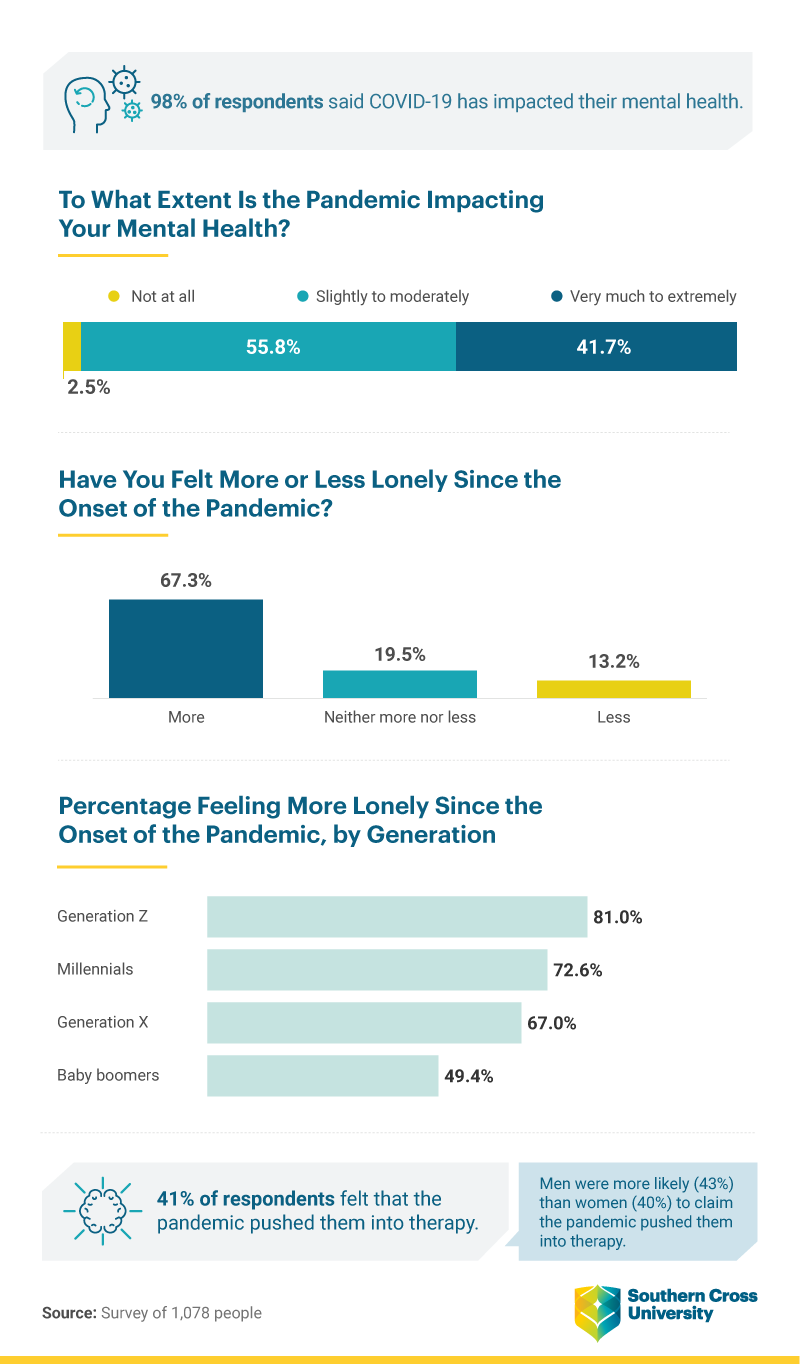
The mental health of respondents had been overwhelmingly impacted for the worse by COVID-19. Just a mere 2.5% of respondents were able to say that the pandemic hadn't affected their mental well-being, while everyone else dealt with at least moderate impacts on their mental states. Women were more likely (44%) than men (33%) to feel that the pandemic had impacted their mental health.
The World Health Organization previously warned in May of "a massive increase in mental health conditions in the coming months," wrought specifically by "anxiety" and "isolation." Loneliness was certainly hard for many respondents to deal with. Sixty-seven per cent agreed that they felt more lonely since the pandemic began. And unfortunately, the psyche of younger generations was hit the hardest. Exactly 81% of Generation Z said they felt more lonely. With schools closed across the country, this would make sense, but 72.6% of millennials (those aged 26 to 40) were also reporting increased loneliness.
Results also showed that the pandemic had ushered 41% of people into therapy already. For those whom therapy is not an option, the Centers for Disease Control and Prevention currently offers these tips for combating COVID-19-related mental stress:
- Pause. Breathe. Notice how you feel.
- Take breaks from COVID-19 content.
- Make time to sleep and exercise.
- Reach out and stay connected.
- Seek help if you're overwhelmed or unsafe.
Trying virtual therapy
Not long before virtual therapy became such a necessity, fewer than half of psychologists offered online therapy at all. Compare that to today and this portion of the study, which shows the percentage of respondents who've tried online therapy, whether they'll continue post-pandemic, and how likely they are to recommend online therapy. We also looked into both cost and affordability of this new frontier.
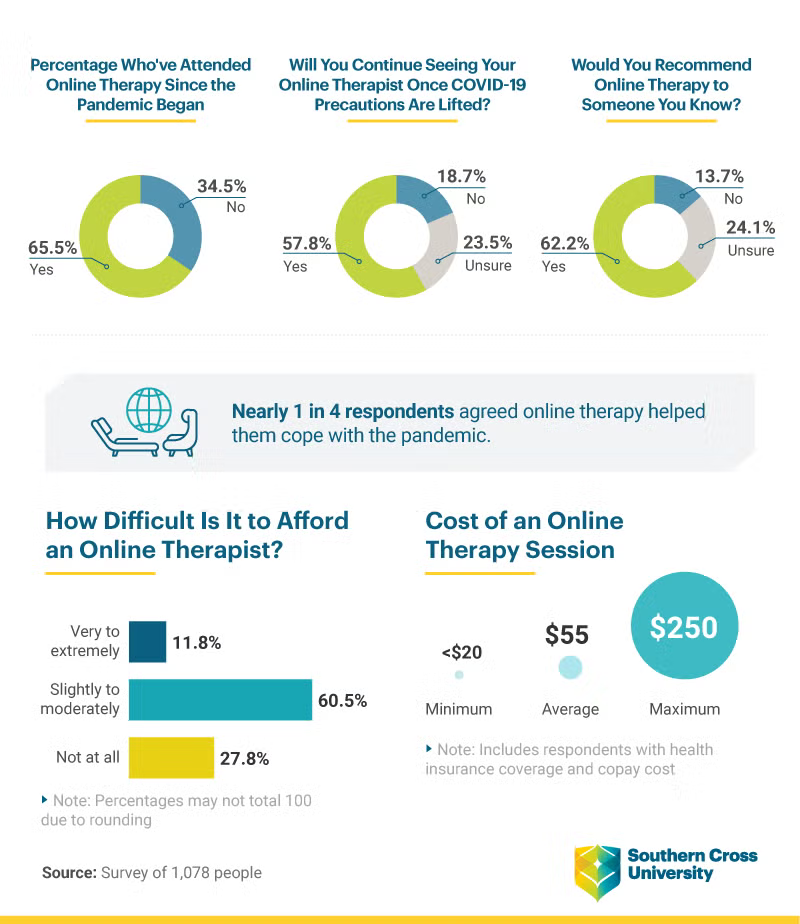
Sixty-six per cent said they had tried virtual therapy, with more than half wanting to continue this way even after the restrictions of COVID-19 were completely lifted. What's more interesting is that while 57.8% said they would continue virtual therapy, an even higher percentage said they would recommend the practice to someone else. In other words, even if they weren't planning to continue themselves, many still found enough value to recommend it to others.
Many states today require that insurance providers cover online therapy in the same way they would traditional therapy. On average, respondents who had already tried therapy online spent $55 on the cause. While we'll break down the holistic cost of this form of therapy later in the study, it's important to note that only 11.8% of people found this very to extremely difficult to afford.
And certain demographics seemed to need this money, or at least need this therapy, more. Men and women were nearly as likely to try online therapy across all ages, but younger generations, in general, were more likely to give it a go. Recall that these younger generations were more often combatting feelings of loneliness as well.
Virtual session frequency
Heavy research has been done on the "optimal" amount of therapy a person needs in order to feel better. Many agree 12 to 16 sessions is a sweet spot, but recent studies by Columbia University suggest even less time may be needed if the therapy is online. The next portion of our study looks at the frequency with which respondents were participating in online therapy as well as how genders and generations were approaching it differently.
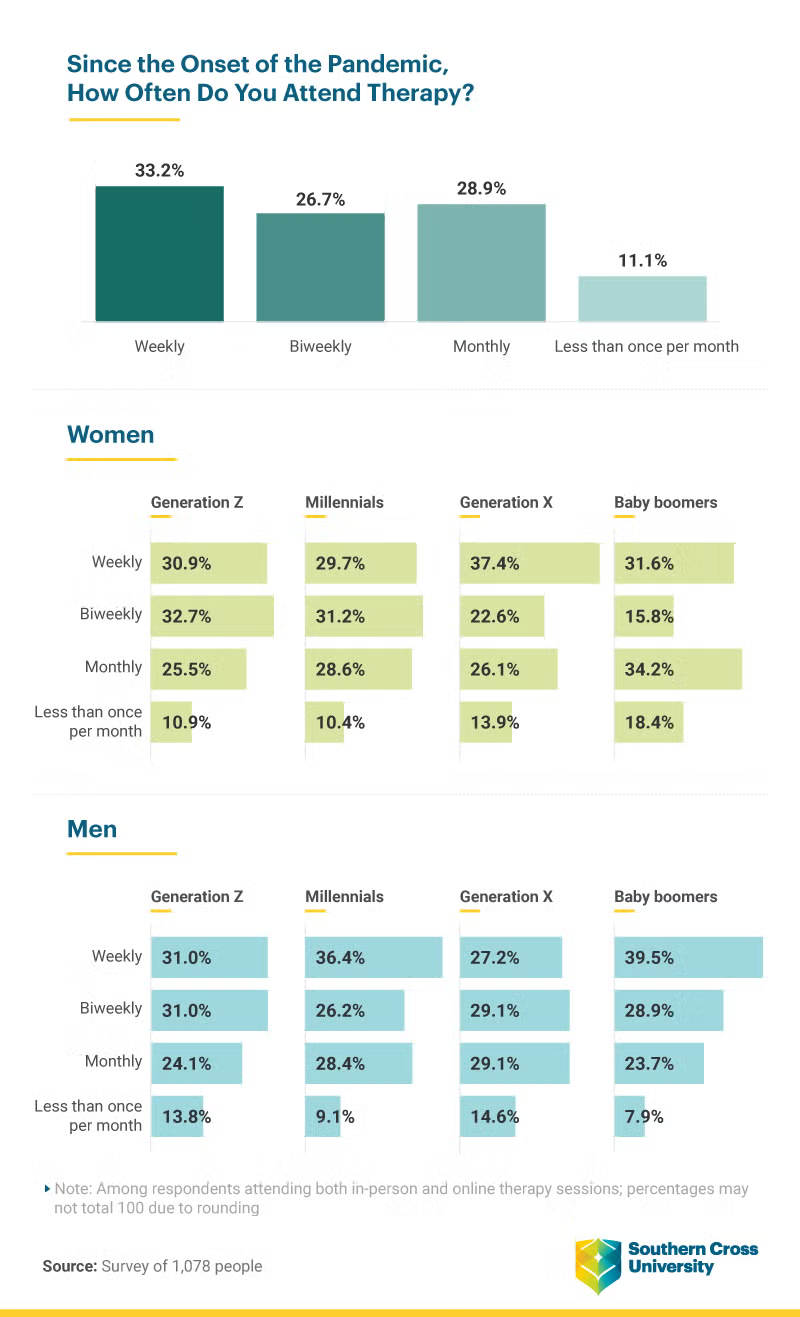
Before the pandemic, or in typical therapy, the frequency of visits may have been harder to manage. You would have to consider the drive, the gas, and more rigid scheduling. Since the pandemic began, 33.2% of respondents went to therapy weekly, 26.7% went biweekly, and 28.9% attended once each month.
Both men and women across all generations were going to online therapy frequently during these trying times. For younger men, weekly therapy seemed to be the sweet spot, as it was for men in the baby boomer generation. For women, it was actually Gen X that went to therapy the most often, or at least once per week. Male millennials were also more likely than female millennials to attend online therapy weekly, at a minimum.
Benefits of talking online
There are plenty of scientific studies done on the molecular level as to how therapy affects the human body and brain chemistry. But we wanted to know the benefits in the respondents' own words. This next part of the study shares what people most commonly found beneficial for them in their day-to-day lives, with regards to online therapy. They also shared the most common drawbacks.
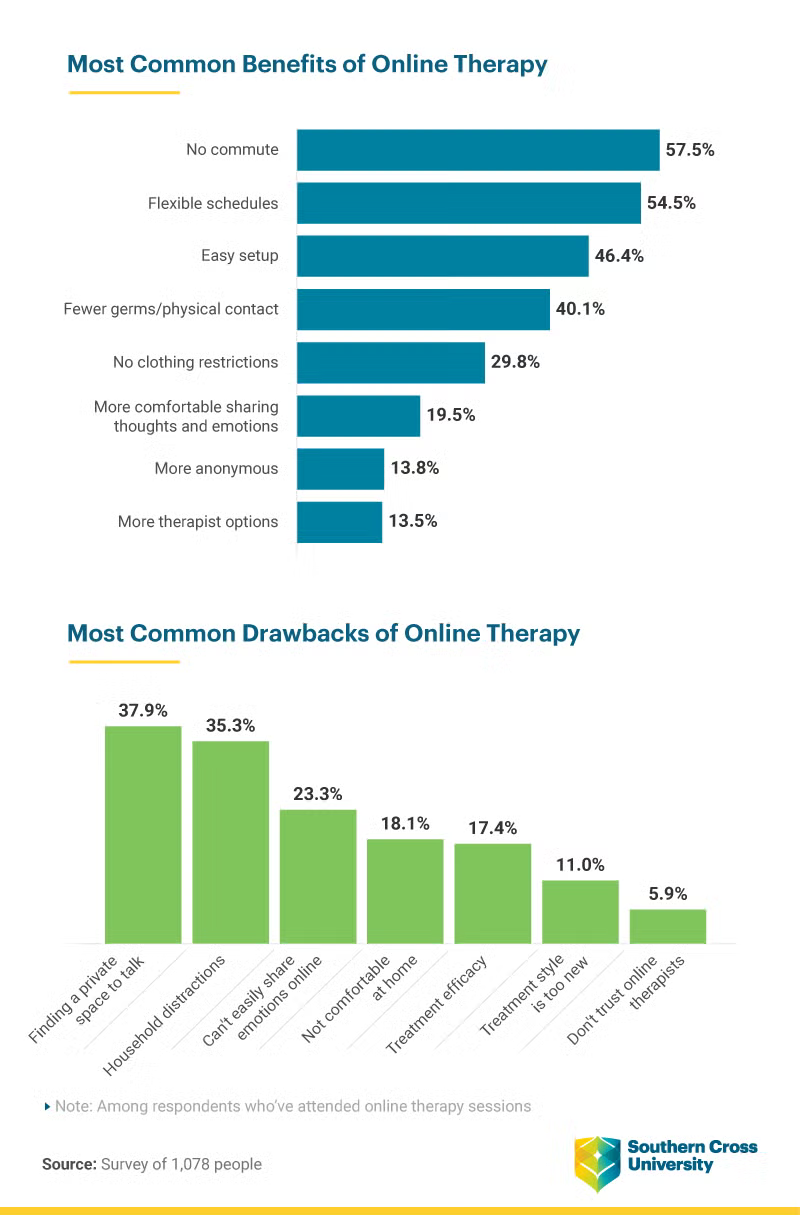
Time, health, and money surfaced as major perks immediately. Without a commute and rigid in-person appointment making, online therapy offered more time and scheduling opportunities than traditional therapy for 57.5% and 54.5% of respondents, respectively. Recall also that respondents previously said their therapy sessions cost $55 online. Here, 43.4% also told us they were able to save on gas by avoiding the office commute. Another 40.1% were relieved to have the chance to avoid more germs by staying at home, and ultimately helped others do the same in the process as well.
As far as actual treatment efficacy was concerned, online therapy did have some drawbacks. More than a third had household distractions that prevented them from actually focusing on the therapy, 11% were sceptical as the "treatment style [was] too new" and nearly a quarter felt that they were unable to share emotions online.
Practitioner preferences
Without in-person therapy as an option, obstacles and distractions presented with online therapy were necessary evils. But once office doors open again, will patients stay the course, or will they choose to commute to the doctor's office again? The final portion of our study asked respondents about overall and specific preferences with regard to online vs in-person therapy.
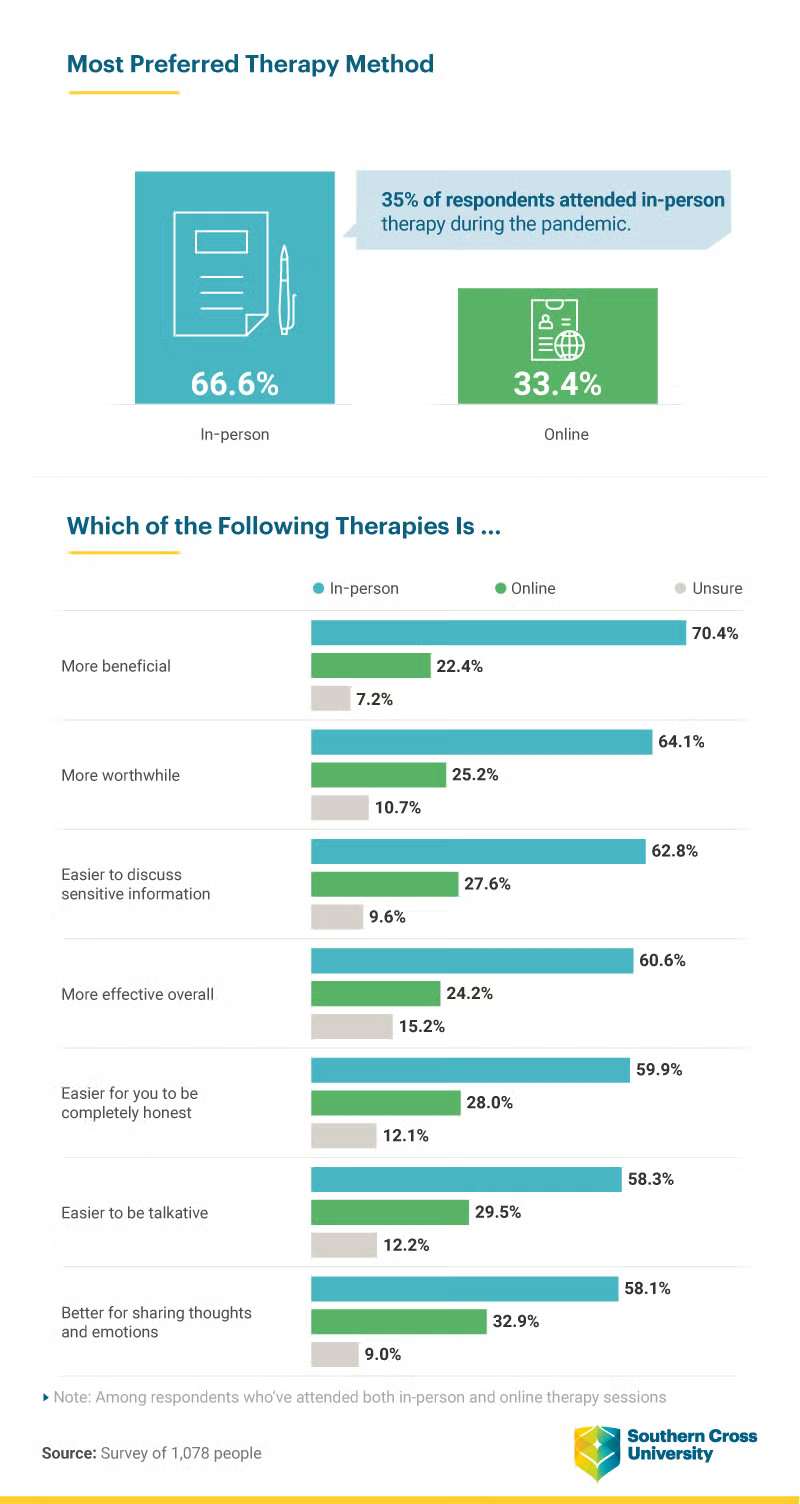
Some experts anticipate that the "psychological fallout" from the pandemic hasn't even shown itself yet. The New York Times calls their forecast a "tsunami of new disorders." Even the World Health Organization anticipates a "massive increase in mental health conditions in the coming months." In other words, the already dire need for therapy will likely intensify.
For those wishing to continue seeing a professional, the odds are you still prefer in-person therapy. At least 66.6% of respondents did, and that was after they had tried the online version. That said, the 33.4% of people who preferred online is no small number. Considering how likely they said they would be to recommend it in addition to its affordability and flexibility, we may see that number grow in the near future.
The general consensus among experienced respondents was that in-person therapy is still not only more beneficial overall (70.4%), but also more effective (60.6%) and created a space that was easier to be talkative (58.3%) and share thoughts and emotions (58.1%). But before you write off online therapy entirely, there's still a very good chance that this consensus may be flipped on its head for your particular situation and demeanour. There were still nearly a third of respondents that felt all of these benefits were more suited to online therapy. And even those who disagreed had still given online therapy a try in the first place.
Keeping your (virtual) chin up
According to Yale psychiatry professor Dr. Steven Southwick, "Very few people understand how resilient they really are until faced with extraordinary circumstances. One of the first things we do is call attention to just that." So whether your preference is for online therapy or in-person, the overall efficacy of the doctor may be more related to your own superpowers than you realize.
Simply because you're online instead of in-person doesn't necessarily mean you can't get the help you need. Many respondents found not only the convenience and financing of online therapy easier, but they also seemed to be putting their money where their mouth was and going (online) multiple times each month.
We were also impressed to see how many people took a leap and gave online therapy a try, even if their overall preference was still to go in person. This is the type of in-depth "studying" that rests at the core of our mission. At Southern Cross University, the possibility for in-depth learning that comes with online courses through engagement and experience is all around you. Education is one of the most important tools you can arm yourself with, not only for financial freedom but for your own inner well-being. If you're interested in taking a new course, whether it be a masters in mental health, business, engineering, or hundreds of other subjects, join the thousands of other students and explore a possible new endeavour with Southern Cross University today.
Methodology and limitations
We surveyed 1,078 people about online therapy amid the COVID-19 pandemic. To qualify for the survey respondents had to indicate participation in a therapy session since the onset of the pandemic. Of the 1,078 surveyed, 51% were Americans, 36% were Europeans, and 13% were Australians. Moreover, 48% identified as female, 51% identified as male, and less than 1% identified as nonbinary. The average age of respondents was 33 with a standard deviation of 11 years. An attention-check question was used to identify and disqualify respondents who failed to read questions and answers in their entirety. The main limitation of this study is the reliance on self-reported responses which are faced with several issues including, but not limited to, attribution, exaggeration, telescoping, and recency bias.
Fair use statement
Access to health care and knowledge about your options is important for anyone dealing with the fallout of a pandemic. If you know anyone that you think could benefit from this study, you are welcome to share it online. However, you must be sure that your purposes are noncommercial and that you link back to this page so its contributors can receive proper credit.







